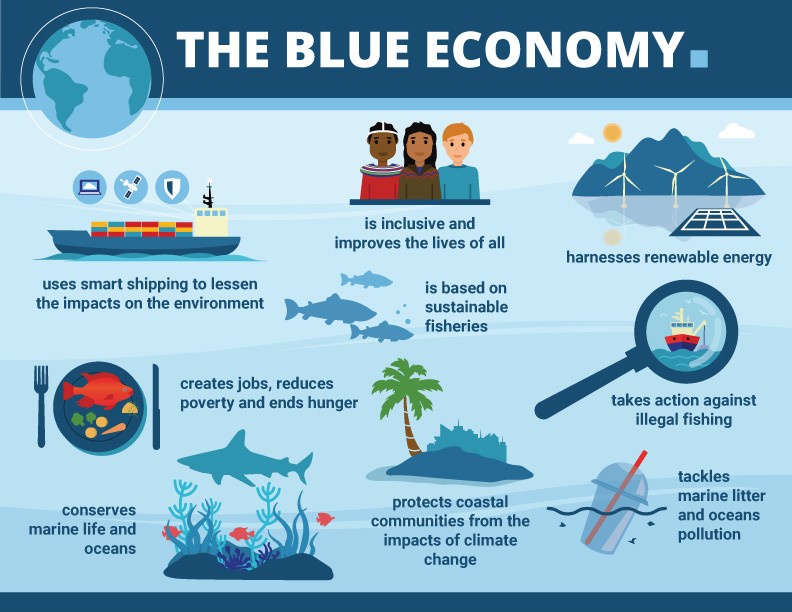Introduction:
As the world seeks sustainable solutions to address global challenges, the concept of the Blue Economy has emerged as a beacon of hope. Centered around the sustainable use of ocean resources, the Blue Economy encompasses a vast array of industries, technologies, and innovations. In this blog, we will delve into the burgeoning Blue Economy market, exploring its potential, challenges, and the transformative impact it can have on global economic and environmental landscapes.
Defining the Blue Economy:
The Blue Economy is a holistic approach to harnessing the economic potential of oceans and seas while ensuring the conservation and sustainable use of marine resources. It goes beyond traditional maritime industries to include sectors such as fisheries, aquaculture, renewable energy, tourism, and marine biotechnology. The emphasis is on fostering economic growth while maintaining the health and resilience of marine ecosystems.
Renewable Energy from the Sea:
One of the key pillars of the Blue Economy is the development of renewable energy sources derived from the sea. Offshore wind farms, tidal and wave energy projects, and ocean thermal energy conversion are among the innovative solutions that capitalize on the immense power potential of the oceans. As the demand for clean energy rises, the Blue Economy becomes a driving force in meeting sustainability goals.
Sustainable Fisheries and Aquaculture:
Fisheries and aquaculture play a pivotal role in the Blue Economy, providing a sustainable source of protein for a growing global population. Embracing responsible fishing practices, promoting aquaculture innovation, and combating illegal, unreported, and unregulated (IUU) fishing are integral to the sustainable growth of the Blue Economy. Collaboration between governments, industry stakeholders, and conservation organizations is essential to strike a balance between economic gains and environmental preservation.
Marine Biotechnology:
The Blue Economy extends its reach into the realm of marine biotechnology, unlocking the potential of marine organisms for medical, pharmaceutical, and industrial applications. From the discovery of novel compounds with therapeutic properties to the development of sustainable bioproducts, marine biotechnology holds promise in addressing health challenges and promoting eco-friendly solutions.
Ocean Tourism and Recreation:
The beauty and biodiversity of the oceans make them prime destinations for tourism and recreation. Sustainable tourism practices, such as marine wildlife watching and eco-friendly diving, contribute to the Blue Economy while raising awareness about marine conservation. Balancing the economic benefits of tourism with the need to protect fragile marine ecosystems is a critical consideration in harnessing the full potential of this sector.
Technological Innovation and Data Analytics:
Advancements in technology, including satellite imagery, autonomous vehicles, and data analytics, play a crucial role in the sustainable management of ocean resources. From monitoring marine ecosystems to optimizing shipping routes for fuel efficiency, technology enables a data-driven approach to decision-making within the Blue Economy. Startups and established companies alike are investing in innovations that enhance the efficiency and sustainability of maritime activities.
Challenges and Environmental Concerns:
While the Blue Economy presents a wealth of opportunities, it is not without challenges. Overfishing, habitat destruction, pollution, and the impacts of climate change pose significant threats to marine ecosystems. Striking a balance between economic development and environmental conservation is a delicate task that requires international cooperation, stringent regulations, and responsible business practices.
International Collaboration and Governance:
The interconnected nature of the oceans necessitates international collaboration in the development and governance of the Blue Economy. Establishing frameworks for sustainable resource management, addressing cross-border challenges, and fostering partnerships among nations are crucial steps in ensuring the equitable and responsible growth of the Blue Economy on a global scale.
Conclusion:
The Blue Economy market represents a transformative approach to sustainable development, offering a blueprint for balancing economic prosperity with environmental stewardship. As nations and industries increasingly recognize the value of our oceans beyond traditional maritime activities, the potential for innovation and positive change is immense. Navigating the waves of the Blue Economy requires a commitment to responsible practices, technological innovation, and international collaboration – a journey that holds the promise of a thriving, resilient, and sustainable future for both humanity and the planet.
More market research, advisory consulting services to discover
At Eninrac, we offer a wide range of, advisory consulting solutions, from We put ‘search' in research to help expand your business with ease. Discover all the possibilities now.


No comments yet